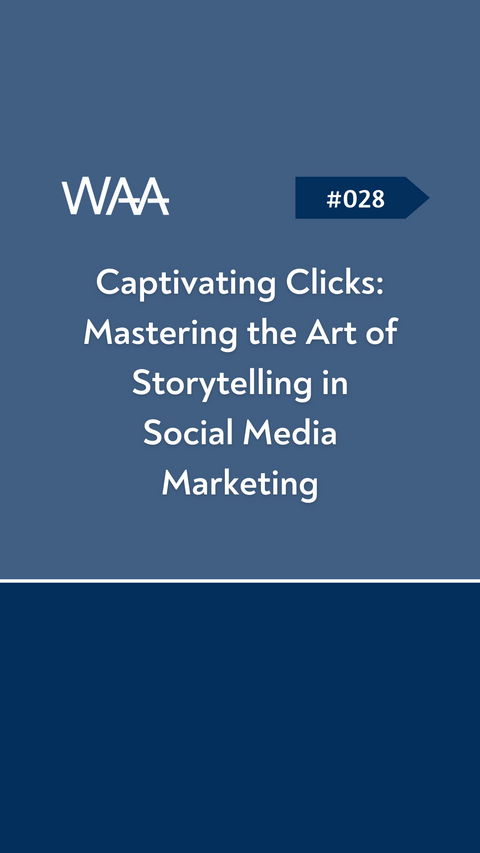
#028 Captivating Clicks: Mastering the Art of Storytelling in Social Media Marketing
In an increasingly saturated and competitive digital landscape, businesses must find creative and effective ways to engage their audience. One powerful strategy that has emerged is the integration of storytelling into social media marketing. Storytelling can captivate and connect with consumers on a deeper level, allowing businesses to forge meaningful relationships and stand out from the crowd. In this blog, we will explore the benefits of incorporating storytelling into social media marketing and provide tips on how businesses can effectively implement this strategy.
The Power of Storytelling
Storytelling is a fundamental part of human communication and has been used for centuries to share knowledge, evoke emotions, and create connections. When it comes to marketing, storytelling enables businesses to convey their brand's values, mission, and unique offerings in a compelling and memorable way. It helps businesses cut through the noise and connect with their audience on an emotional level, which is essential for building trust and loyalty.
Benefits of Storytelling in Social Media Marketing
-
Humanizes the Brand: Storytelling humanizes the brand by allowing businesses to showcase the people, passion, and purpose behind their products or services. By sharing authentic and relatable stories, businesses can foster a sense of connection and empathy, making their brand more approachable and trustworthy.
-
Differentiates from Competitors: In crowded industries, storytelling can set a business apart from its competitors. By creating a unique narrative and sharing stories that resonate with their target audience, businesses can differentiate themselves and create a memorable brand identity.
-
Increases Engagement: Social media platforms thrive on engaging content, and storytelling is the perfect tool to captivate and engage an audience. Well-crafted stories spark curiosity, hold attention, and encourage interaction, driving increased engagement and fostering a sense of community around the brand.
-
Drives Emotional Connection: Effective storytelling evokes emotions, and emotions play a significant role in consumer decision-making. By appealing to the emotions of their audience, businesses can create deeper connections, increase brand affinity, and ultimately drive customer loyalty.
-
Boosts Brand Recall: Stories are more memorable than facts or statistics. When businesses present information in a narrative format, it becomes easier for their audience to remember and recall their brand. This increases the chances of their brand being top-of-mind when customers are making purchasing decisions.
Tips for Integrating Storytelling in Social Media Marketing
-
Know Your Audience: Understand your target audience's demographics, interests, and pain points to craft stories that resonate with them. This will enable you to speak directly to their needs and desires, establishing a deeper connection.
-
Identify Core Brand Messages: Determine the key messages and brand values you want to communicate through storytelling. Make sure they align with your overall marketing strategy and resonate with your target audience.
-
Use Various Formats: Social media platforms offer diverse content formats like images, videos, live streaming, and interactive features. Utilize these formats to tell your stories in different ways and cater to the preferences of your audience.
-
Bring Characters to Life: Develop relatable and likable characters that represent your brand and take your audience on a journey. These characters can be real people, employees, or even fictional personas that embody your brand's personality.
-
Keep Stories Authentic: Authenticity is key to successful storytelling. Avoid overly promotional content and focus on genuine narratives that reflect your brand's values and experiences.
-
Create Story Arcs: Structure your stories with a clear beginning, middle, and end. This helps to create anticipation, engage the audience, and deliver a satisfying resolution or message.
-
Encourage User-Generated Content: Encourage your audience to share their stories related to your brand by utilizing user-generated content. This not only strengthens the storytelling element but also builds a sense of community around your brand.
-
Measure and Optimize: Use social media analytics to measure the impact of your storytelling efforts. Measure engagement, reach, and sentiment to gain insights and optimize your strategy moving forward.
Final Thoughts
Integrating storytelling into social media marketing has the potential to transform the way businesses engage with their audience. By harnessing the power of stories, businesses can create genuine connections, increase engagement, differentiate from competitors, and ultimately build long-lasting relationships with their customers. With careful planning, a deep understanding of your audience, and a commitment to authenticity, incorporating storytelling into your social media strategy can be a game-changer for your brand. So, start crafting compelling stories and watch as your audience becomes more captivated and connected than ever before.
